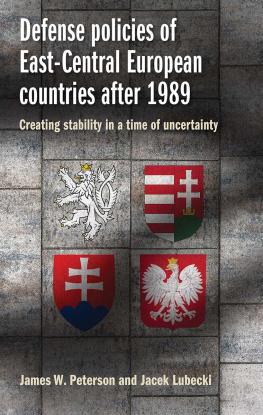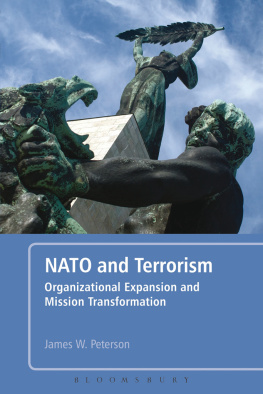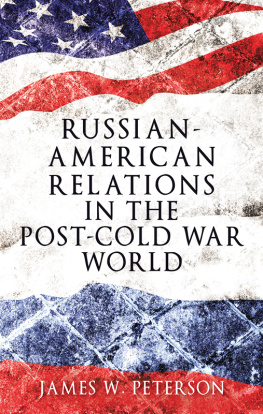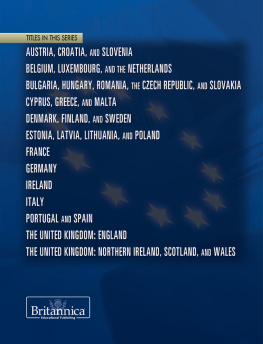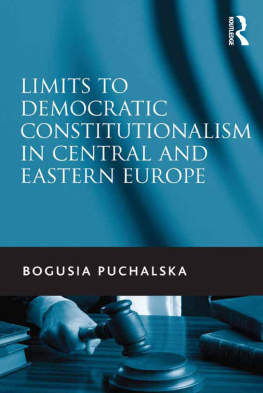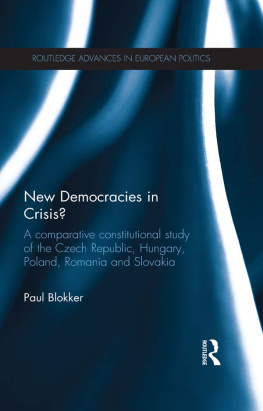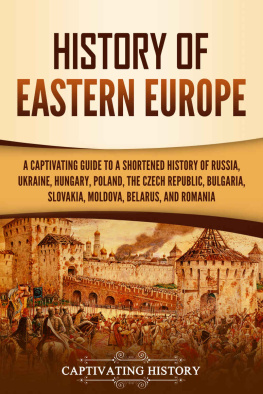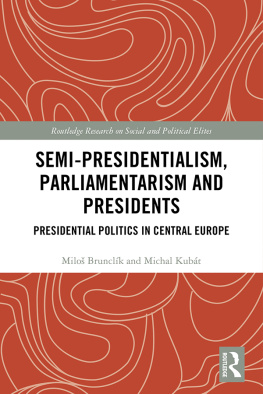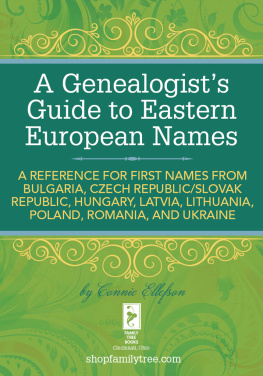Defense policies of East-Central European countries after 1989
Defense policies of East-Central European countries after 1989
Creating stability in a time of uncertainty
JAMES W. PETERSON AND JACEK LUBECKI
Manchester University Press
Copyright James W. Peterson and Jacek Lubecki 2019
The right of James W. Peterson and Jacek Lubecki to be identified as the authors of this work has been asserted by them in accordance with the Copyright, Designs and Patents Act 1988.
Published by Manchester University Press
Altrincham Street, Manchester M1 7JA
www.manchesteruniversitypress.co.uk
British Library Cataloguing-in-Publication Data
A catalogue record for this book is available from the British Library
ISBN 978 1 5261 1042 8 hardback
First published 2019
The publisher has no responsibility for the persistence or accuracy of URLs for any external or third-party internet websites referred to in this book, and does not guarantee that any content on such websites is, or will remain, accurate or appropriate.
Typeset in Sabon and Gill by
Servis Filmsetting Ltd, Stockport, Cheshire
Contents
It is important to acknowledge the political courage of those leaders and societies who accomplished the 1989 changes that led to the adoption of liberal-democratic systems in the Czech Republic, Hungary, Poland, and Slovakia. Those transformations enabled the preparation of national defense policies that served to protect their states as well as contributing to the important regional and global missions of NATO and the EU.
The editorial staff at Manchester University Press have provided unwavering support for the project and the authors are thankful for that. Jim Peterson also acknowledges the mutual respect that he and his co-author Jacek Lubecki have for each other, a reality without which this book would not have been a possibility. Finally, Jim would like to thank his wife Bonnie for her strong support for this and all of his projects.
Jacek Lubecki would like to extend his thanks first and foremost to Jim Peterson, without whom the book would not have happened, and to his Hungarian consultant, Professor Andrs Rcz of Pter Pzmny Catholic University in Budapest, without whom the Hungarian chapter could not have been written. He is also grateful to the publishers of The Polish Review, who allowed him to use selections from his article Poland in Iraq (2005) in of the book. His thanks go to his fiance Christine Barsky, who inspired him during the writing, his daughter Francesca Lubecki-Wilde, who helped him with editing, and to his mother Kazimiera Lubecka, for her assistance with the research.
| AfD | Alternative for Germany |
| CFSP | Common Foreign and Security Policy (EU) |
| CSDP | Common Security and Defense Policy (EU) |
| EEAS | European External Action Service |
| ENP | European Neighborhood Policy |
| ESDP | European Security and Defense Policy (EU) |
| EUAM | EU Advisory Mission (Iraq) |
| EUFOR | EU Force |
| EULEX | EU Role of Law Mission |
| GDP | Gross Domestic Product |
| HDF | Hungarian Defense Forces |
| KFOR | Kosovo Force |
| MON | Ministry of National Defense (Poland) |
| NATO | North Atlantic Treaty Organization |
| OSCE | Organization for Security and Cooperation in Europe |
| PESCO | Permanent Structured Cooperation on Security and Defense (EU) |
| PfP | Partnership for Peace (NATO) |
| PiS | Law and Justice Party (Poland) |
| PO | Citizens Platform Party (Poland) |
| PRT | Provincial Reconstruction Team (Afghanistan) |
| V4 | Visegrd Four (Czech Republic, Hungary, Poland, Slovakia) |
| WTO | Warsaw Treaty Organization (or Warsaw Pact) |
Theoretical framework
develops theoretical constructs that will guide the analysis in ensuing chapters. Its central argument is that post-communist convergence between the Visegrd Four (V4) defense policies is best understood as a result of the universal adoption of liberal-democratic political systems and ideologies by the countries in question. However, the chapter argues, post-communist divergence in the respective countries defense policies, made especially visible by their post-2014 differential reactions to the Russo-Ukrainian Crisis and its fallout, cannot be understood within the framework of liberalism as both a political system and a theory of international relations. Different schools and concepts of realism and constructivism are therefore evoked as necessary for illuminating the noted divergence between Poland, which responded robustly and in militaristic fashion to the perception of a Russian threat, and the rest of the Visegrd countries, with their lukewarm responses. Within realism, the chapter draws attention to Polands distinctive geopolitical position. Within constructivism, the chapter considers the notions of role theory and strategic cultures as a key for understanding the countries diverging polices.
Pre-1945 historical and political experiences
focuses on the deep regional and historical contexts that were characteristic of the period leading up to the imposition of communist controls in the late 1940s. There is differentiation between the long era leading up to nation-state formation after the First World War and the interwar/Second World War era.
Prior to 1918, there was much historical variation in the political experiences of the four geographic units spread across the East-Central European region.
Czechs fell under Austrian control after their defeat at the Battle of White Mountain in 1620, and so three centuries under the control of Vienna became their destiny but also the source of deep resentment against control by an outside power. However, Bohemian experiences prior to the defeat by Austria became a kind of basis for national pride and even democratic expression in later decades. The memory of King Wenceslaus in the tenth century animated artists and musical composers in the late nineteenth century. Contributions of King Charles IV in the fourteenth century reminded later Czechs of the importance of his reign as well as practical results such as the creation of the second oldest university in Europe, construction of the famous bridge across the Vltava River, and initial work on what later became known as Prague Castle. A century later, Jan Hus inspired a movement that challenged domination from Rome and the detailed strictures of the Catholic Church. As such, the Hussite battles animated later aspirations for popular participation within the Austrian Empire and beyond.
For Poles, the key memory was loss of their geographic, territorial, and political homeland, which had been a large multinational empire, between the partitions by the three large empires in the 1790s and recreation of their own state after the First World War. Just like in the Czech case, the memories of pre-foreign colonization glories animated Polish nationalism of the nineteenth century. Indeed, early nineteenth-century dreams of its recreation led Romantic poets such as Mickiewicz to compare Polands situation to that of the crucified Christ. According to Mickiewicz, Polands intense religiosity and loyalty to Rome would somehow bring about a national resurrection, which in turn would usher in a universal liberation of all peoples of Europe. In more concrete terms, Poles continued their military and political struggles for independence under Napoleon and in a series of national uprisings (1830, 1846, 1848, 1863, 1905), mostly aimed against Russia. It was also in a war against Soviet Russia that Poland solidified its independence in the 191820 period.

